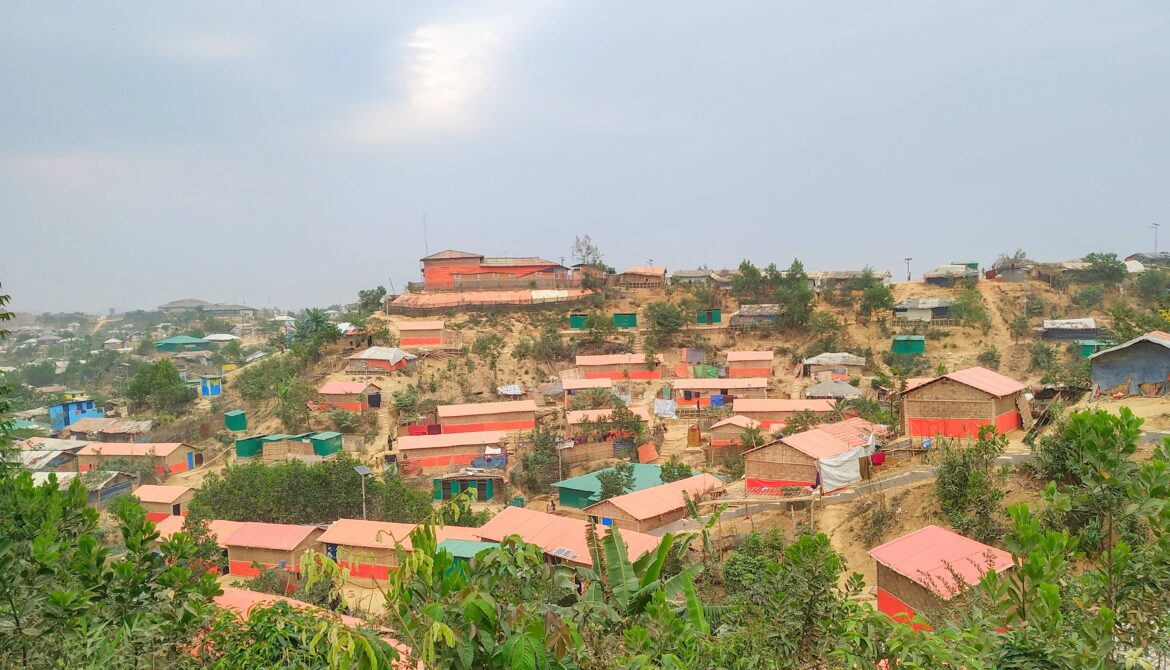When asked to ponder over the refugee crisis, our minds immediately reroute towards the Syrian refugee crisis or, more recently, the Ukrainian refugees owing to the unceasing media attention they garner. However, the largest refugee camp belongs to Myanmar’s Rohingya refugee crisis. Sporadically recognized as ‘forgotten’ or ‘neglected’ by political writers such as CBC’s Nick Logan and Al Jazeera’s Mohammed Jamjoom, this piece aims to shed light on the lives of 1.1 million refugees and capture the political essence through time and other dimensions.
While scrutinizing the root cause of this crisis, the United Nations (UN) Secretary-General Antonio Guterres identifies the Rohingya as “one of, if not the, most discriminated people in the world,” thereby suggesting religious antagonism as a reason for the crisis. Generally speaking, systematic persecution and religious hostility continue to persist even in twenty-first-century South Asia. Coupled with corruption and its consequences, incidents of religious hostility are deeply devastating. Yet, the Rohingya crisis remains an agonizing and yet forgotten refugee crisis.
Before diving into the nucleus of the matter, it is critical to understand the Rohingya’s history and identity. Inhabiting the geographical region of Rakhine, the Rohingya people see themselves as the pioneer Muslims of Myanmar, who can be dated back to the 15th century. With every passing generation, they have developed their identity in the form of their own language and unique culture. The consequence of being a Muslim minority in a Buddhist-majority country, as proclaimed by the Human Rights Watch, is denied citizenship, followed by a predicament of statelessness.
In other words, this strong taste of discrimination emerged itself in the loss of nationality through the Citizenship Law of 1982. Under this, the state of Myanmar refused to classify the Rohingya as an ethnic group, thereby terminating their citizenship and eliminating their national rights. In conjunction with the UN Declaration of Human Rights, this law violates Article 15, which claims that “everyone has a right to nationality and no one shall be arbitrarily deprived of it.” Moreover, as a repercussion of the lack of citizenship, the Rohingya cannot engage in electing governments, military matters, and economic activities, further violating their human rights and breaching more laws from the UN Declaration of Human Rights.
It is inevitable that the plight of the Rohingya people has rapidly deteriorated since the ramification of this citizenship law. Without any legal recognition, acknowledgment of citizenship, or residency, the Rohingya have inadequate access to education, economic opportunities, and health services, thus widening chronic poverty and marginalization. This has transpired in mass displacements such as the June 1992 Exodus where 250,000 Rohingya migrated from Arakan to Bangladesh. Regardless, the pinnacle of the crisis occurred in August 2017, when Myanmar’s military annihilated the towns of northern Rakhine. Villages burned to the ground, and human atrocities such as genocide and rape ruined lives at unprecedented rates. This resulted in the mass displacement of 900,000 Rohingyas in the Cox Bazar region.
Due to the large influx of Rohingya refugees dating back to the 1970s as well as in 2017, today, 1.1 million refugees are living in Refugee camps in Bangladesh. The bitter reality of life in these refugee camps includes lack of sanitation, access to limited education, overpopulation, and more hardships. More recently, since December 2020, the Bangladeshi government has attempted to improve living conditions and transferred nearly 20,000 Rohingya refugees from Cox’s Bazar to Bhasan Char, an island in the Bay of Bengal. The government has worked relentlessly to ensure that modern facilities are provided. For instance, the 13,000-acre island has access to fresh water throughout the year, an uninterrupted supply of electricity, and all related necessities. On the other hand, the remaining Rohingyas in Myanmar, which are estimated to be 600,000, are still subjected to government persecution, confined in concentration camps, their right to freedom of movement neglected, and access to health care and food restricted.
While debating about the future of the Rohingyas, it is important to account for Myanmar’s military coup in 2021, a response to the allegedly false elections conducted in 2020) which was instigated by the military. Matthew Smith, co-founder of the human rights advocacy group Fortify Rights, asserts that “the coup has aggravated living conditions for the Rohingyas in Myanmar as this was the military regime responsible for the atrocities to the Rohingya community over many years.” Moreover, Smith also proclaims that the process of repatriation appears unrealistic in the near future, as the Rohingyas would be affected once again. Thus, refugee Rohingyas are discouraged from moving back to Myanmar.
Furthermore, in an attempt to grasp the broader context of the crisis, one inevitable question that arises is the contribution of the United Nations. Although the Human Rights Council failed to pass a resolution on the Rohingya crisis on 24th August 2022, or rather the fifth anniversary of the army’s ‘religious cleansing’, Antonio Guterres echoed the voices of various humanitarian organizations such that “the Rohingya ought to be included in the country’s political crisis” in order to protect the Rohingyas from injustices for once and for all.
In conclusion, there is a rigid dichotomy between the universal rights that every human should enjoy and the rights of the Rohingya people. It is crucial for powerful global stakeholders, humanitarian organizations, and the United Nations to coordinate and establish realistic frameworks to ensure the security and welfare of the Rohingya community. More importantly, it is crucial to ensure that the Rohingya can enjoy their fundamental human rights, which have been taken away from them mercilessly on the grounds of religion.
Edited by Anyssa Boyer
Rashi Lalan is in her second year at McGill University and is pursuing a degree in Economics as well as International Developmental Studies. She is a staff writer for Catalyst and is particularly interested in South Asian politics and culture.

